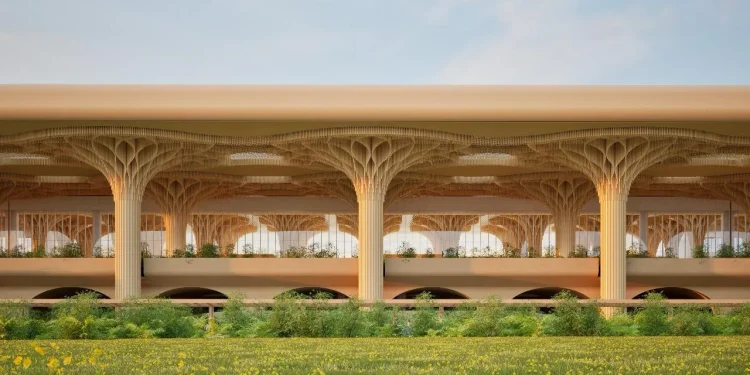A major transformation of Guwahati’s airport is nearing completion as the ₹2,000 crore terminal upgrade project enters its final phase ahead of an October deadline. Managed by Adani Airport Holdings, the ambitious redevelopment will significantly enhance the airport’s capacity while showcasing Assam’s rich cultural heritage through innovative design elements.
The centerpiece of the project is a modern, eco-friendly terminal with a unique “Bamboo Orchids” theme that draws inspiration from the region’s natural beauty. This culturally significant design incorporates motifs of the foxtail orchid, a symbol of love and fertility in Assamese culture, blending functionality with aesthetic elements that celebrate local identity.
Once completed, the new terminal will nearly double the airport’s capacity, enabling it to handle 13.1 million passengers annually. This substantial increase will position Guwahati as a major aviation hub for Northeast India and improve connectivity to the region.
Construction has already reached advanced stages, with significant progress reported on several fronts. The expansion includes widened entry and departure lanes to improve traffic flow, installation of DigiYatra gates for seamless passenger processing, and enhanced security check-in areas designed to reduce wait times and streamline operations.
A key technical improvement is the development of a new taxiway that will nearly double the airport’s aircraft handling efficiency, increasing capacity from 18 to 34 take-offs and landings per hour. This enhancement will significantly reduce congestion and improve on-time performance for airlines operating at the facility.
Passenger comfort has been prioritized throughout the design, with the terminal featuring expanded retail and dining options, recreational areas, landscaped gardens, and improved wayfinding through enhanced signage. These elements aim to create a more welcoming and stress-free environment for travelers.
The project’s sustainability focus aligns with global trends in airport design and construction, incorporating eco-friendly materials and energy-efficient systems. This approach not only reduces the environmental impact but also sets a benchmark for future infrastructure development in the region.
Beyond the immediate improvements to air travel, the upgraded airport is expected to deliver broader economic benefits to Assam and the Northeast. Enhanced connectivity typically attracts increased investment, tourism, and business opportunities, potentially serving as a catalyst for regional development.
As the October deadline approaches, attention is focused on ensuring that all aspects of the project meet the highest standards of quality and functionality. Upon completion, the modernized Guwahati airport will stand as a gateway that reflects both the cultural richness of Assam and its aspirations for sustainable economic growth.
The terminal upgrade represents a significant milestone in the region’s infrastructure development, demonstrating how modern facilities can be created while honoring local heritage and embracing environmentally responsible practices.





